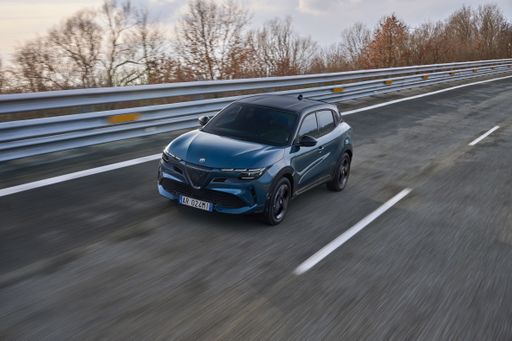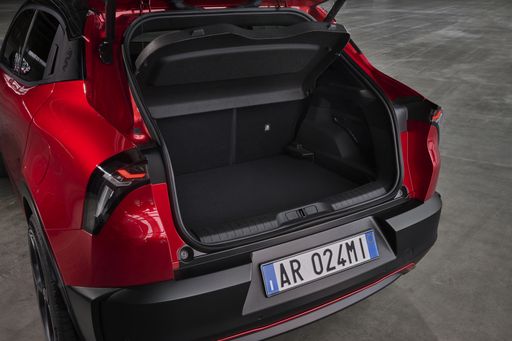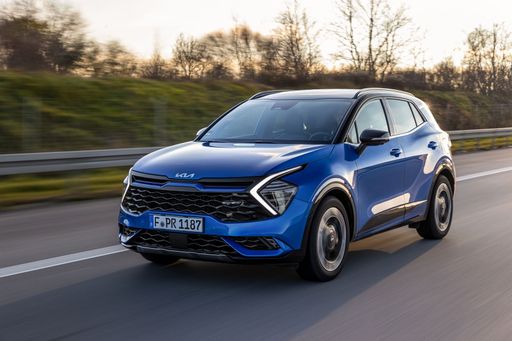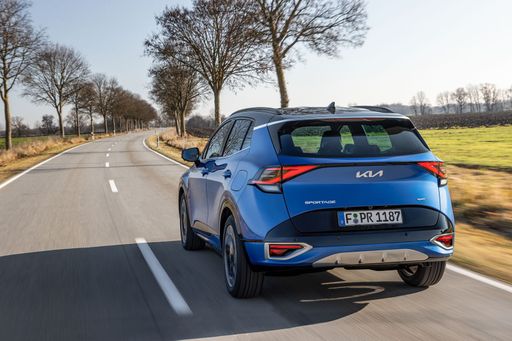Alfa Romeo Junior vs Kia Sportage - Differences and prices compared
Costs and Efficiency:
Price and efficiency are often the first things buyers look at. Here it becomes clear which model has the long-term edge – whether at the pump, the plug, or in purchase price.
Alfa Romeo Junior has a a bit advantage in terms of price – it starts at 26100 £, while the Kia Sportage costs 30200 £. That’s a price difference of around 4062 £.
Fuel consumption also shows a difference: Alfa Romeo Junior manages with 4.80 L and is therefore slight more efficient than the Kia Sportage with 5 L. The difference is about 0.20 L per 100 km.
Engine and Performance:
Under the bonnet, it becomes clear which model is tuned for sportiness and which one takes the lead when you hit the accelerator.
When it comes to engine power, the Alfa Romeo Junior has a somewhat edge – offering 280 HP compared to 239 HP. That’s roughly 41 HP more horsepower.
In acceleration from 0 to 100 km/h, the Alfa Romeo Junior is distinct quicker – completing the sprint in 5.90 s, while the Kia Sportage takes 7.90 s. That’s about 2 s faster.
In terms of top speed, the Alfa Romeo Junior performs minimal better – reaching 206 km/h, while the Kia Sportage tops out at 203 km/h. The difference is around 3 km/h.
There’s also a difference in torque: Alfa Romeo Junior pulls hardly perceptible stronger with 345 Nm compared to 320 Nm. That’s about 25 Nm difference.
Space and Everyday Use:
Beyond pure performance, interior space and usability matter most in daily life. This is where you see which car is more practical and versatile.
Seats: offers more seating capacity – vs .
In curb weight, Alfa Romeo Junior is a bit lighter – 1380 kg compared to 1552 kg. The difference is around 172 kg.
In terms of boot space, the Kia Sportage offers evident more room – 587 L compared to 415 L. That’s a difference of about 172 L.
In maximum load capacity, the Kia Sportage performs clearly perceptible better – up to 1776 L, which is about 496 L more than the Alfa Romeo Junior.
When it comes to payload, Kia Sportage clearly perceptible takes the win – 580 kg compared to 420 kg. That’s a difference of about 160 kg.
Who wins the race?
The Alfa Romeo Junior proves to be secures victory with a clear margin and therefore becomes our DriveDuel Champion!
Alfa Romeo Junior is the better all-rounder in this comparison.
 @ Alfa Romeo / Stellantis Media
@ Alfa Romeo / Stellantis Media
Alfa Romeo Junior
Costs and Consumption
View detailed analysis
Engine and Performance
View detailed analysis
Dimensions and Body
View detailed analysis
Alfa Romeo Junior
The Alfa Romeo Junior captures the essence of Italian design with its sleek lines and compact dimensions, making it an icon of elegance and performance. With a spirited driving experience and a charming retro aesthetic, it appeals to enthusiasts and casual drivers alike. This delightful car embodies the brand's rich heritage while remaining a fun and engaging option for those seeking a unique automotive experience.
details @ Alfa Romeo / Stellantis Media
@ Alfa Romeo / Stellantis Media
 @ Alfa Romeo / Stellantis Media
@ Alfa Romeo / Stellantis Media
 @ Alfa Romeo / Stellantis Media
@ Alfa Romeo / Stellantis Media
Kia Sportage
The Kia Sportage proves you don't have to choose between style and sensible family motoring, wrapping modern, confident looks around a roomy, well-equipped cabin. It's an easy car to live with — comfortable on daily runs, pleasantly engaging when you want a bit of fun, and kind to your wallet so you can keep smiling at the fuel pump.
details @ Kia Corporation
@ Kia Corporation
 @ Kia Corporation
@ Kia Corporation
 @ Kia Corporation
@ Kia Corporation
 @ Kia Corporation
@ Kia Corporation
 @ Alfa Romeo / Stellantis Media
@ Alfa Romeo / Stellantis Media
|
 @ Kia Corporation
@ Kia Corporation
|
|
|
|
Costs and Consumption |
|
|---|---|
|
Price
26100 - 41600 £
|
Price
30200 - 43900 £
|
|
Consumption L/100km
4.8 - 5.4 L
|
Consumption L/100km
5 - 7.9 L
|
|
Consumption kWh/100km
15.1 - 17.5 kWh
|
Consumption kWh/100km
-
|
|
Electric Range
344 - 410 km
|
Electric Range
-
|
|
Battery Capacity
0.4 - 51 kWh
|
Battery Capacity
-
|
|
co2
0 - 119 g/km
|
co2
132 - 180 g/km
|
|
Fuel tank capacity
44 - 45 L
|
Fuel tank capacity
52 - 54 L
|
Dimensions and Body |
|
|---|---|
|
Body Type
SUV
|
Body Type
SUV
|
|
Seats
5
|
Seats
5
|
|
Doors
5
|
Doors
5
|
|
Curb weight
1380 - 1689 kg
|
Curb weight
1552 - 1733 kg
|
|
Trunk capacity
340 - 415 L
|
Trunk capacity
526 - 587 L
|
|
Length
4173 mm
|
Length
4540 mm
|
|
Width
1781 mm
|
Width
1865 mm
|
|
Height
1505 - 1538 mm
|
Height
1645 mm
|
|
Max trunk capacity
1205 - 1280 L
|
Max trunk capacity
1715 - 1776 L
|
|
Payload
390 - 420 kg
|
Payload
543 - 580 kg
|
Engine and Performance |
|
|---|---|
|
Engine Type
Electric, Petrol MHEV
|
Engine Type
Petrol, Full Hybrid, Diesel MHEV
|
|
Transmission
Automatic
|
Transmission
Manuel, Automatic
|
|
Transmission Detail
Reduction Gearbox, Dual-Clutch Automatic
|
Transmission Detail
Manual Gearbox, Dual-Clutch Automatic, Automatic Gearbox
|
|
Drive Type
Front-Wheel Drive, All-Wheel Drive
|
Drive Type
Front-Wheel Drive, All-Wheel Drive
|
|
Power HP
136 - 280 HP
|
Power HP
136 - 239 HP
|
|
Acceleration 0-100km/h
5.9 - 9.1 s
|
Acceleration 0-100km/h
7.9 - 11.6 s
|
|
Max Speed
150 - 206 km/h
|
Max Speed
180 - 203 km/h
|
|
Torque
230 - 345 Nm
|
Torque
250 - 320 Nm
|
|
Number of Cylinders
3
|
Number of Cylinders
4
|
|
Power kW
107 - 207 kW
|
Power kW
100 - 176 kW
|
|
Engine capacity
1199 cm3
|
Engine capacity
1598 cm3
|
General |
|
|---|---|
|
Model Year
2024 - 2025
|
Model Year
2025
|
|
CO2 Efficiency Class
A, C, D
|
CO2 Efficiency Class
F, D, E, G
|
|
Brand
Alfa Romeo
|
Brand
Kia
|
What drive types are available for the Alfa Romeo Junior?
Available configurations include Front-Wheel Drive or All-Wheel Drive.
The prices and data displayed are estimates based on German list prices and may vary by country. This information is not legally binding.
